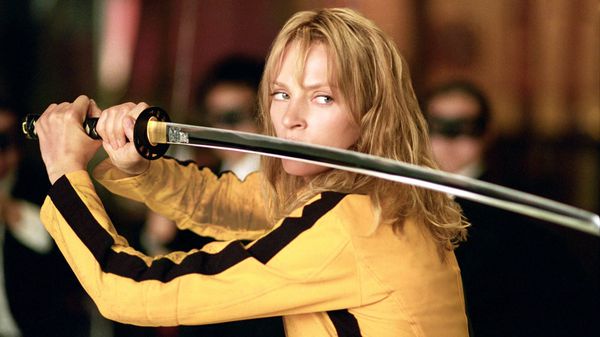Eye For Film >> Movies >> Kill Bill: Volume 1 (2003) Film Review
Kill Bill: Volume 1
Reviewed by: Jennie Kermode

A pregnant bride shot dead in black and white, heady and emotional, borrowing from surrealist Mexican cinema; lurid credits in 'sixties TV cop show style; an apparently unavoidable showdown between two polite women in a quiet suburban home with children's toys all over the lawn. From the very start, Kill Bill is unmistakably Tarantino, plundering its sources with love, running through the cliches with glee, but willing to veer right off into moments of horror and real emotional intensity: a child witnessing her mother's murder. It's true that Kill Bill is essentially just a string of fight scenes loosely bound by plot, and Tarantino doesn't seem to be aiming for anything deep, yet one is always aware that this is not because he can't; if only more trashy films were made with this display of skill, Hollywood might have a reputation it could properly be proud of.
This violent tale of Charlie's Angels gone horribly wrong is not Tarantino at his best, but it does feature some striking performances, most notably from Uma Thurman as the anonymous Bride. Not since Sarah Connor has cinema presented us with a heroine quite so single-minded or furiously self-sufficient. Thurman seems aware of the silliness of this, but plays it straight, and everything makes a sort of sense. Awakening from a coma, judging that four years have passed, she sets out at once to avenge her attempted murder and the loss of her child. In doing so, she must take out each of the remaining members of the Deadly Viper Assassination Squad of which she was once a part, gradually working her way closer to the boss, Bill. Naturally, this is a rambling tale, which is why studios insisted on it being broken into two parts (or 'volumes'). It is very well paced, and hardly ever drags, being broken down into a number of smaller stories, in keeping with the genre. Even the longest fight scenes are intelligently broken down so as to keep audience attention. The choreography is stunning. Although there can be as many as thirty people fighting onscreen at one time, it's always possible to follow what's happening to the heroine.

Probably the most interesting thing about the Bride is just how plainly she is played. Lucy Liu's imposing Tokyo gang queen, who dominates the latter part of the film, is always impeccably dressed and decorated, glamorous and feminine. Daryl Hannah's frustrated assassin sashays around in mini-skirts with elegantly sculpted hair. Thurman, by contrast, wears whatever is available, has no make-up, has trashed hair, and spends much of her time covered in blood - not even flatteringly arranged blood. Her natural beauty is visible, but is never played on. She is always a person and never an object. This is rare for the lead in any film, but especially for such a heroine, and it has the effect of drawing the audience in more closely to identify with her and her plight. Despite her martial prowess and absurdly good connections, she is the perfect everyman character. The absurdity of this in such a heavily stylised film is remarkably appealing.
Tarantino's unconventional treatment of female characters doesn't end there. Liu, of course, has something special to offer, also being a star in Drew Barrymore's recent Charlie's Angels movies, but here she gets to exert a force which is more than the sum of her feminine charms. The board room scene where she stands on a table and yells at the men around her is something entirely new. Women in films have two ways of raising their voices: a high-pitched, hysterical noise which tells the audience they're thwarted or need to be protected; and a more forceful but still high, unemotional style identified with bitches. In this scene, Liu simply yells like anyone might in real life - like a male character might - and the effect is startling. Despite the cartoonish nature of the story, the characters on display here all have moments in which they come across as so real that they remind us of the cartoonish nature of the rest of the industry.
Kill Bill is, ultimately, a throwaway film, a popcorn classic, fun but forgettable - yet it knows this, and goes about its business with a rare energy. The result is thrilling, charming, and hugely enjoyable.
Reviewed on: 27 Jun 2007





















